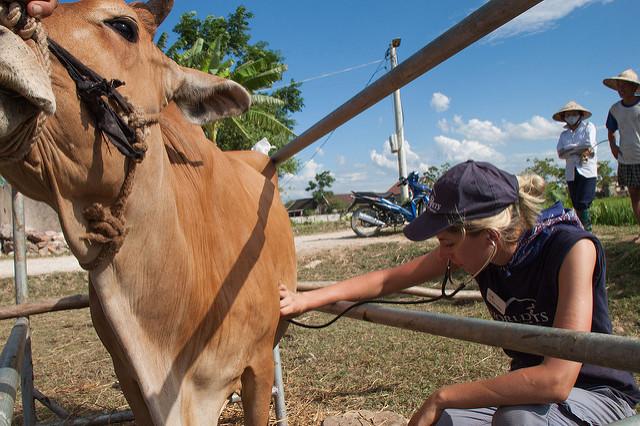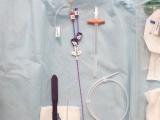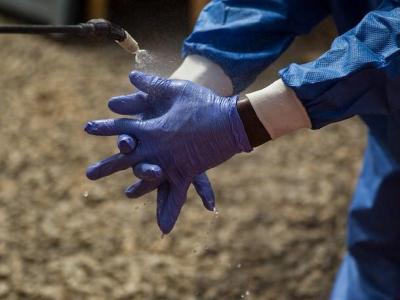At a Paris meeting this week, the World Organization for Animal Health (OIE) presented the key principles of its strategy for limiting antimicrobial resistance (AR), with a primary focus on encouraging governments to strengthen the regulation of veterinary medicines, now sorely lacking in many countries.
The strategy aims to help governments "to, step by step, prepare a legal framework and build the necessary capacity to manage the problem of antimicrobial resistance more effectively," the OIE said in a May 24 press release.
The strategy is spelled out in a 9-page report titled "Combatting Antimicrobial Resistance through a One Health Approach: Actions and OIE Strategy," which was presented May 24 at the OIE'’s 84th General Session.
Antimicrobials sold freely
A recent OIE study found that more than 110 of 130 countries that were surveyed lacked "comprehensive laws to regulate the import, production, distribution, and use of veterinary medicines, including antimicrobials," according to the OIE release. As a result, such drugs are often sold freely and used without veterinary supervision, and often are adulterated.
The OIE said its strategy is designed to help countries use and benefit from the various guidelines and tools the agency has developed in accordance with its mandate to battle AR.
The topics covered in the report include harmonization and intergovernmental standards, training and education, surveillance of AR and use of animal antimicrobials, availability of good-quality veterinary drugs, awareness and communication, and good governance and capacity building.
The report notes that AR is a primary concern for both human and animal health. The OIE collaborated with the World Health Organization (WHO) and United Nations Food and Agriculture Organization (FAO) in developing the Global Action Plan on Antimicrobial Resistance, published in May 2015, which called on governments to prepare their own action plans within 2 years.
In discussing surveillance of AR, the report says that very little information is available globally on resistance in animal pathogens. The OIE offers standards for harmonizing AR surveillance programs and guidance on testing bacteria for antimicrobial susceptibility.
OIE collecting data on use
The OIE also says data on global use of antimicrobials in animals are not available, but the agency is working to fill that gap. Under a mandate to set up a global database, the OIE began collecting information late last year. By the end of April it had received 127 "answers," most of them providing quantitative data on antimicrobial use.
The availability of quality veterinary medicines is another major concern spelled out in the report. If a drug doesn't contain the concentration of antimicrobial agents defined in its license, using it could promote resistance, the OIE notes.
A 2012 OIE survey found that among countries that regulated veterinary drugs, more than 22% had no requirements for quality control, the report says. It advises that regulatory programs should be based on international standards, have a clearly defined scope and objectives, and be carried out by an independent authority.
Adding to concerns about the lack of quality-control regulations is the circulation of low-quality and counterfeit medications, some of which can be very hard to identify as fake. The report says the OIE should increase its collaboration with other international organizations to help member countries improve their quality-control efforts and fight the distribution of counterfeit drugs.
Vaccines as alternatives
One possible way to reduce the use of animal antimicrobials is to increase the use of vaccines, the report observes. The OIE said it is working to prioritize diseases for which vaccines could serve this purpose. In addition, the agency and the US Department of Agriculture will hold the Second International Symposium on Alternatives to Antibiotics in December.
In discussing governance and capacity building, the report notes that the OIE provides various tools to help governments implement AR standards, such as the Evaluation of Performance of Veterinary Services (PVS) Tool and the PVS Gap Analysis Tool, which provides quantitative data on needs and priorities.
In other observations, the report says the OIE has asked each member country to appoint a "national focal point" for certain topics, including veterinary medicines, and has conducted training since 2010 for veterinary medicine focal points
In its press release, the OIE pledges to continue to help member countries raise awareness about AR by improving the communication skills of veterinary services and providing various free resource materials.
The report's conclusion asserts that the challenge of AR calls for a "whole-of-society engagement through a One Health approach."
The agency says that all stakeholders must join the fight: "Good practices shall be developed and implemented by each actor of the veterinary medicinal product chain covering the whole chain from manufacture [and] distribution to the end use. Antimicrobial agents as pure active ingredients shall not be administered directly to the animals without any registration as a veterinary medicinal product, and without any quality control."
See also:
May 24 OIE press release
Full OIE report
























